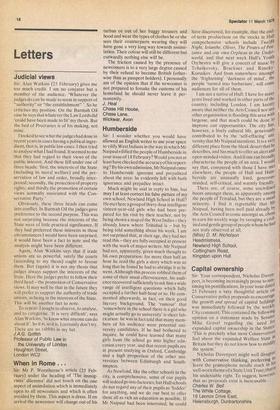Judicial views
Sir: Alan Watkins (25 February) gives me. too much credit. I am no conjurer but a member of the audience. 'Whatever the judges do can be made to seem in support of "authority" or "the establishment" '. So he criticises my position. On the Burmah Oil case he says that whatever the Law Lords did 'could have been made toile my thesis. But the bed of Procrustes is of his making, not mine.
I looked to see what the judges had done in recent years in cases having a political ingredient, that is, in public law cases. I then tried to analyse what I had found. It seemed to me that they had regard to their views of the public interest. And these fell under one of three heads: 'first, the interests of the State (including its moral welfare) and the preservation of law and order, broadly interpreted; secondly, the protection of property rights; and thirdly the promotion of certain views normally associated with the Conservative Party.'
Obviously, these three heads can come into conflict. In Burmah Oil the judges gave preference to the second purpose. This was not surprising because the interests of the State were of little practical significance. If they had preferred these interests in those circumstances I would have been surprised, it would have been a fact to note and the analysis might have been different.
Again, Alan Watkins says that if trade unions are so powerful, surely the courts (according to my thesis) ought to favour them. But (again) it is not my thesis that judges always support the interests of the State. Here the judges prefer to follow their third head —the promotion of Conservative views. It may well be that in the future they will prefer to support the authority of trade unions, as being in the interests of the State. This will be another fact to note.
To repeat: I sought to observe, to analyse, and to categorise. 'It is very difficult', says Alan Watkins, `to know what anyone can do about it'. So it is, so it is. I certainly don't try. There are no rabbits in my hat.
J.A.G. Griffith Professor of Public Law in the University of London Houghton Street, London WC2


































 Previous page
Previous page